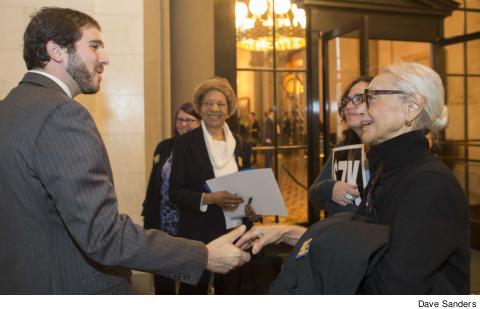 |
Between February and May of this year, a team of 10 PSC members at Borough of Manhattan Community College (BMCC) talked with scores of colleagues about VOTE-COPE, the PSC’s political action arm. By the end of the semester, we had increased the number of VOTE-COPE contributors at BMCC by more than 50 percent and the total contributions BMCC faculty and staff members make to the political fund by more than 75 percent. We did this because political action is – has to be – a normal part of our union’s life, and the voluntary contributions that fund our union’s political action a normal part of PSC membership.
The contracts our union negotiates with management, the working conditions CUNY faculty and staff members face on our campuses, the living conditions our students return to when they leave campus – public policies and the allocation of public funds shape them all. That’s why electoral involvement is just as vital for the PSC as collective bargaining or contract enforcement.
POLITICS MATTER
Engagement in electoral politics has brought important recent victories for our union and has opened the door for future changes. In the 2013 mayoral election, the PSC endorsed Bill de Blasio early and campaigned for him enthusiastically. Our relationship with the new mayor led to 2014 policy changes that kept adjunct health insurance secure and the Welfare Fund fiscally viable. In 2018 PSC support for insurgent New York Senate candidates helped flip partisan control of the State Senate, allowing the passage of some good legislation and bringing a new group of CUNY champions to the Senate, an institution which has in the past been cool toward the PSC’s goals.
Legislative change is a long game. Political relationships and political power are built over time. To build them, you need to plan ahead and that means knowing what resources you will have. The PSC’s electoral fund is supported almost entirely by members’ voluntary contributions to VOTE-COPE – not by our regular membership dues. When a PSC member signs up for VOTE-COPE and chooses a per-paycheck contribution level, that financial commitment provides our union with predictable resources to plan strategies for the long term.
Even though VOTE-COPE is essential to the PSC’s political power, not enough PSC members currently contribute. What we found at BMCC this spring is that although many longtime members had heard of VOTE-COPE, few understood its role and even fewer had ever been asked by a colleague, in person, if they would contribute. But in personal conversations, where questions can be answered and the urgency of political action can be conveyed, members were usually quick to sign up. New members often signed a VOTE-COPE card along with a union membership card, treating the two actions as one.
CENTRAL TO UNIONISM
Our BMCC team’s work this spring convinced me that when we include a VOTE-COPE invitation as a regular part of conversations about PSC membership, members respond. Support for our union’s political work isn’t a special interest or something only for those who teach American government or watch MSNBC obsessively. It’s fundamental. Throughout the PSC, we should treat VOTE-COPE as the essential piece of union membership that it is.
If you are a PSC member who does not yet contribute to VOTE-COPE, you can sign up at psc-cuny.org/cope.
Geoffrey Kurtz is an associate professor of political science at Borough of Manhattan Community College, where he recently completed a term as PSC chapter chair.

